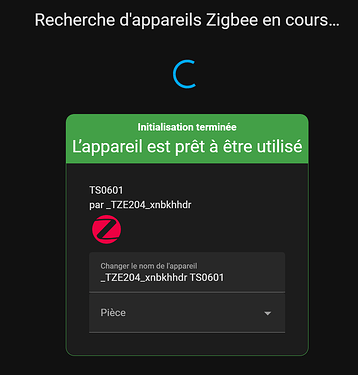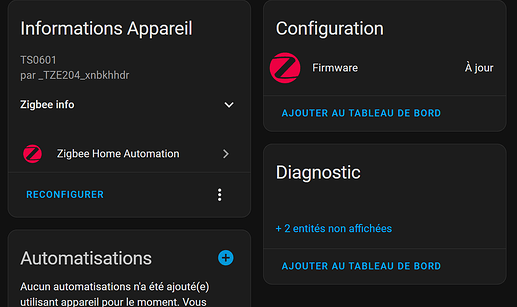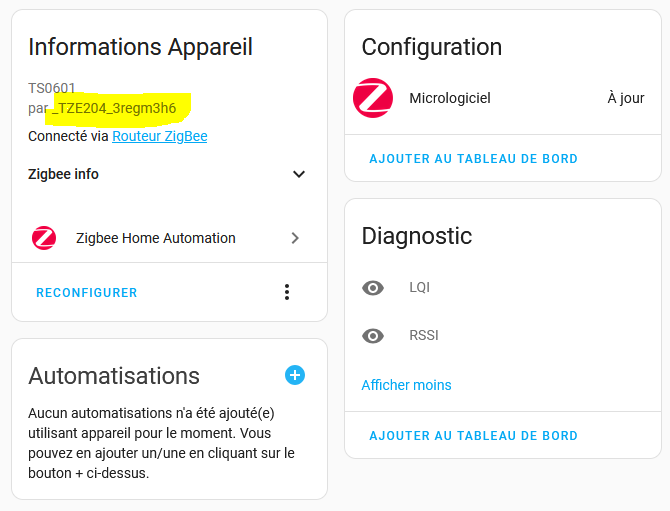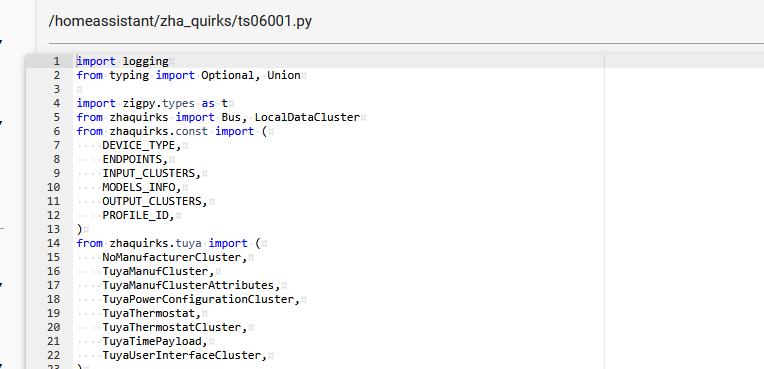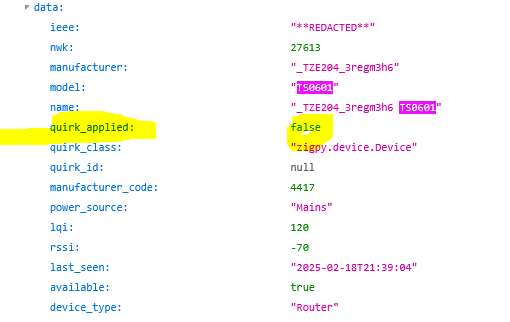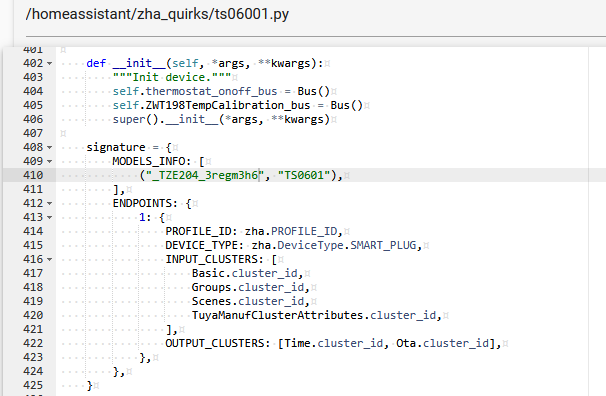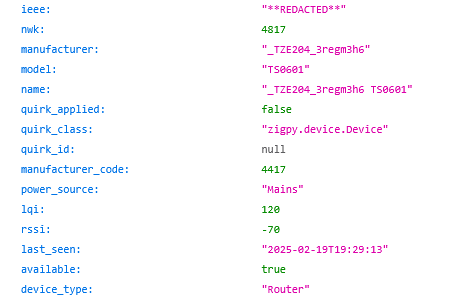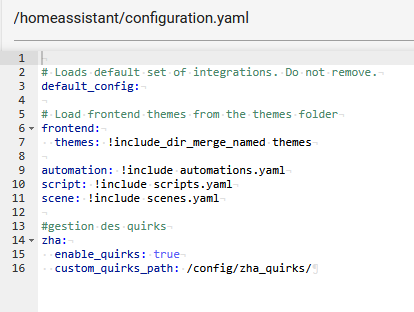c’est un convertisseur qui permet de faire fonctionner ton appareil en Zigbee.
pour utiliser un quirk, il faut ajouter ces lignes dans ton configuration.yaml:
zha:
enable_quirks: true
custom_quirks_path: /config/zha_quirks/
tu crées un dossier zha_quirks dans le dossier /config ( si tu utilises file editor, il est nommé homeassistant/ ).
tu copie le quirk , tout ce code :
import logging
from typing import Optional, Union
import zigpy.types as t
from zhaquirks import Bus, LocalDataCluster
from zhaquirks.const import (
DEVICE_TYPE,
ENDPOINTS,
INPUT_CLUSTERS,
MODELS_INFO,
OUTPUT_CLUSTERS,
PROFILE_ID,
)
from zhaquirks.tuya import (
NoManufacturerCluster,
TuyaManufCluster,
TuyaManufClusterAttributes,
TuyaPowerConfigurationCluster,
TuyaThermostat,
TuyaThermostatCluster,
TuyaTimePayload,
TuyaUserInterfaceCluster,
)
from zhaquirks.tuya.mcu import EnchantedDevice
from zigpy.profiles import zha
from zigpy.zcl import foundation
from zigpy.zcl.clusters.general import (
AnalogOutput,
Basic,
Groups,
OnOff,
Ota,
Scenes,
Time,
)
from zigpy.zcl.clusters.hvac import Thermostat
_LOGGER = logging.getLogger(__name__)
ZWT198_TARGET_TEMP_ATTR = 0x0202 # target room temp (degree)
ZWT198_TEMPERATURE_ATTR = 0x0203 # current room temp (degree/10)
ZWT198_MODE_ATTR = 0x0404 # [0] schedule [1] manual
ZWT198_SYSTEM_MODE_ATTR = 0x0101 # device [0] off [1] on
ZWT198_HEAT_STATE_ATTR = 0x0465 # [0] heating icon off [1] heating icon on
ZWT198_CHILD_LOCK_ATTR = 0x0109 # [0] unlocked [1] locked
ZWT198_TEMP_CALIBRATION_ATTR = 0x0213 # temperature calibration (degree)
ZWT198ManufClusterSelf = {}
class CustomTuyaOnOff(LocalDataCluster, OnOff):
"""Custom Tuya OnOff cluster."""
def __init__(self, *args, **kwargs):
"""Init."""
super().__init__(*args, **kwargs)
self.endpoint.device.thermostat_onoff_bus.add_listener(self)
# pylint: disable=R0201
def map_attribute(self, attribute, value):
"""Map standardized attribute value to dict of manufacturer values."""
return {}
async def write_attributes(self, attributes, manufacturer=None):
"""Implement writeable attributes."""
records = self._write_attr_records(attributes)
if not records:
return [[foundation.WriteAttributesStatusRecord(foundation.Status.SUCCESS)]]
manufacturer_attrs = {}
for record in records:
attr_name = self.attributes[record.attrid].name
new_attrs = self.map_attribute(attr_name, record.value.value)
_LOGGER.debug(
"[0x%04x:%s:0x%04x] Mapping standard %s (0x%04x) "
"with value %s to custom %s",
self.endpoint.device.nwk,
self.endpoint.endpoint_id,
self.cluster_id,
attr_name,
record.attrid,
repr(record.value.value),
repr(new_attrs),
)
manufacturer_attrs.update(new_attrs)
if not manufacturer_attrs:
return [
[
foundation.WriteAttributesStatusRecord(
foundation.Status.FAILURE, r.attrid
)
for r in records
]
]
await ZWT198ManufClusterSelf[
self.endpoint.device.ieee
].endpoint.tuya_manufacturer.write_attributes(
manufacturer_attrs, manufacturer=manufacturer
)
return [[foundation.WriteAttributesStatusRecord(foundation.Status.SUCCESS)]]
async def command(
self,
command_id: Union[foundation.GeneralCommand, int, t.uint8_t],
*args,
manufacturer: Optional[Union[int, t.uint16_t]] = None,
expect_reply: bool = True,
tsn: Optional[Union[int, t.uint8_t]] = None,
):
"""Override the default Cluster command."""
if command_id in (0x0000, 0x0001, 0x0002):
if command_id == 0x0000:
value = False
elif command_id == 0x0001:
value = True
else:
attrid = self.attributes_by_name["on_off"].id
success, _ = await self.read_attributes(
(attrid,), manufacturer=manufacturer
)
try:
value = success[attrid]
except KeyError:
return foundation.Status.FAILURE
value = not value
(res,) = await self.write_attributes(
{"on_off": value},
manufacturer=manufacturer,
)
return [command_id, res[0].status]
return [command_id, foundation.Status.UNSUP_CLUSTER_COMMAND]
class ZWT198ManufCluster(TuyaManufClusterAttributes):
"""Manufacturer Specific Cluster of thermostatic valves."""
def __init__(self, *args, **kwargs):
"""Init."""
super().__init__(*args, **kwargs)
global ZWT198ManufClusterSelf
ZWT198ManufClusterSelf[self.endpoint.device.ieee] = self
set_time_offset = 1970
server_commands = {
0x0000: foundation.ZCLCommandDef(
"set_data",
{"param": TuyaManufCluster.Command},
False,
is_manufacturer_specific=False,
),
0x0010: foundation.ZCLCommandDef(
"mcu_version_req",
{"param": t.uint16_t},
False,
is_manufacturer_specific=True,
),
0x0024: foundation.ZCLCommandDef(
"set_time",
{"param": TuyaTimePayload},
False,
is_manufacturer_specific=False,
),
}
attributes = TuyaManufClusterAttributes.attributes.copy()
attributes.update(
{
ZWT198_TEMPERATURE_ATTR: ("temperature", t.uint32_t, True),
ZWT198_TARGET_TEMP_ATTR: ("target_temperature", t.uint32_t, True),
ZWT198_MODE_ATTR: ("mode", t.uint8_t, True),
ZWT198_SYSTEM_MODE_ATTR: ("system_mode", t.uint8_t, True),
ZWT198_HEAT_STATE_ATTR: ("heat_state", t.uint8_t, True),
ZWT198_CHILD_LOCK_ATTR: ("child_lock", t.uint8_t, True),
ZWT198_TEMP_CALIBRATION_ATTR: ("temperature_calibration", t.int32s, True),
}
)
DIRECT_MAPPED_ATTRS = {
ZWT198_TEMPERATURE_ATTR: (
"local_temperature",
lambda value: value * 10,
),
ZWT198_TARGET_TEMP_ATTR: (
"occupied_heating_setpoint",
lambda value: value * 10,
),
ZWT198_TEMP_CALIBRATION_ATTR: (
"local_temperature_calibration",
lambda value: value * 10,
),
}
def _update_attribute(self, attrid, value):
"""Override default _update_attribute."""
super()._update_attribute(attrid, value)
#if attrid in self.DIRECT_MAPPED_ATTRS:
if attrid in self.DIRECT_MAPPED_ATTRS and value < 60000:
self.endpoint.device.thermostat_bus.listener_event(
"temperature_change",
self.DIRECT_MAPPED_ATTRS[attrid][0],
value
if self.DIRECT_MAPPED_ATTRS[attrid][1] is None
else self.DIRECT_MAPPED_ATTRS[attrid][1](value),
)
if attrid == ZWT198_CHILD_LOCK_ATTR:
self.endpoint.device.ui_bus.listener_event("child_lock_change", value)
self.endpoint.device.thermostat_onoff_bus.listener_event(
"child_lock_change", value
)
elif attrid == ZWT198_MODE_ATTR:
self.endpoint.device.thermostat_bus.listener_event("mode_change", value)
elif attrid == ZWT198_TEMP_CALIBRATION_ATTR:
self.endpoint.device.ZWT198TempCalibration_bus.listener_event(
"set_value", value / 10
)
elif attrid == ZWT198_HEAT_STATE_ATTR:
self.endpoint.device.thermostat_bus.listener_event("state_change", value)
elif attrid == ZWT198_SYSTEM_MODE_ATTR:
self.endpoint.device.thermostat_bus.listener_event(
"system_mode_change", value
)
class ZWT198Thermostat(TuyaThermostatCluster):
"""Thermostat cluster for thermostatic valves."""
_CONSTANT_ATTRIBUTES = {
0x0015: 500, # MIN HEAT SETPOINT
0x0016: 3100, # MAX HEAT SETPOINT
0x001B: Thermostat.ControlSequenceOfOperation.Heating_Only,
}
DIRECT_MAPPING_ATTRS = {
"local_temperature_calibration": (
ZWT198_TEMP_CALIBRATION_ATTR,
lambda value: round(value / 10),
),
"occupied_heating_setpoint": (
ZWT198_TARGET_TEMP_ATTR,
lambda value: round(value / 10),
),
}
def __init__(self, *args, **kwargs):
"""Init."""
super().__init__(*args, **kwargs)
self.endpoint.device.thermostat_bus.add_listener(self)
def map_attribute(self, attribute, value):
"""Map standardized attribute value to dict of manufacturer values."""
if attribute in self.DIRECT_MAPPING_ATTRS:
return {
self.DIRECT_MAPPING_ATTRS[attribute][0]: value
if self.DIRECT_MAPPING_ATTRS[attribute][1] is None
else self.DIRECT_MAPPING_ATTRS[attribute][1](value)
}
if attribute == "operation_preset":
if value == 1:
return {ZWT198_MODE_ATTR: 0}
if value == 2:
return {ZWT198_MODE_ATTR: 1}
if attribute in ("programing_oper_mode", "occupancy"):
if attribute == "occupancy":
occupancy = value
oper_mode = self._attr_cache.get(
self.attributes_by_name["programing_oper_mode"].id,
self.ProgrammingOperationMode.Simple,
)
else:
occupancy = self._attr_cache.get(
self.attributes_by_name["occupancy"].id, self.Occupancy.Occupied
)
oper_mode = value
if occupancy == self.Occupancy.Occupied:
if oper_mode == self.ProgrammingOperationMode.Schedule_programming_mode:
return {ZWT198_MODE_ATTR: 0}
if oper_mode == self.ProgrammingOperationMode.Simple:
return {ZWT198_MODE_ATTR: 1}
self.error("Unsupported value for ProgrammingOperationMode")
else:
self.error("Unsupported value for Occupancy")
if attribute == "system_mode":
if value == self.SystemMode.Off:
mode = 0
else:
mode = 1
return {ZWT198_SYSTEM_MODE_ATTR: mode}
def mode_change(self, value):
"""Preset Mode change."""
if value == 0:
operation_preset = self.Preset.Schedule
prog_mode = self.ProgrammingOperationMode.Schedule_programming_mode
occupancy = self.Occupancy.Occupied
else:
operation_preset = self.Preset.Manual
prog_mode = self.ProgrammingOperationMode.Simple
occupancy = self.Occupancy.Occupied
self._update_attribute(
self.attributes_by_name["programing_oper_mode"].id, prog_mode
)
self._update_attribute(
self.attributes_by_name["occupancy"].id, occupancy
)
self._update_attribute(
self.attributes_by_name["operation_preset"].id, operation_preset
)
def system_mode_change(self, value):
"""System Mode change."""
if value == 0:
mode = self.SystemMode.Off
else:
mode = self.SystemMode.Heat
self._update_attribute(
self.attributes_by_name["system_mode"].id, mode
)
class ZWT198UserInterface(TuyaUserInterfaceCluster):
"""HVAC User interface cluster for tuya electric heating thermostats."""
_CHILD_LOCK_ATTR = ZWT198_CHILD_LOCK_ATTR
class ZWT198ChildLock(CustomTuyaOnOff):
"""On/Off cluster for the child lock function of the electric heating thermostats."""
def child_lock_change(self, value):
"""Child lock change."""
self._update_attribute(self.attributes_by_name["on_off"].id, value)
def map_attribute(self, attribute, value):
"""Map standardized attribute value to dict of manufacturer values."""
if attribute == "on_off":
return {ZWT198_CHILD_LOCK_ATTR: value}
class ZWT198TempCalibration(LocalDataCluster, AnalogOutput):
"""Analog output for Temp Calibration."""
def __init__(self, *args, **kwargs):
"""Init."""
super().__init__(*args, **kwargs)
self.endpoint.device.ZWT198TempCalibration_bus.add_listener(self)
self._update_attribute(
self.attributes_by_name["description"].id, "Temperature Calibration"
)
self._update_attribute(self.attributes_by_name["max_present_value"].id, 10)
self._update_attribute(self.attributes_by_name["min_present_value"].id, -10)
self._update_attribute(self.attributes_by_name["resolution"].id, 0.1)
self._update_attribute(self.attributes_by_name["application_type"].id, 13 << 16)
self._update_attribute(self.attributes_by_name["engineering_units"].id, 62)
def set_value(self, value):
"""Set value."""
self._update_attribute(self.attributes_by_name["present_value"].id, value)
def get_value(self):
"""Get value."""
return self._attr_cache.get(self.attributes_by_name["present_value"].id)
async def write_attributes(self, attributes, manufacturer=None):
"""Override the default Cluster write_attributes."""
for attrid, value in attributes.items():
if isinstance(attrid, str):
attrid = self.attributes_by_name[attrid].id
if attrid not in self.attributes:
self.error("%d is not a valid attribute id", attrid)
continue
self._update_attribute(attrid, value)
await ZWT198ManufClusterSelf[
self.endpoint.device.ieee
].endpoint.tuya_manufacturer.write_attributes(
{ZWT198_TEMP_CALIBRATION_ATTR: value * 10},
manufacturer=None,
)
return ([foundation.WriteAttributesStatusRecord(foundation.Status.SUCCESS)],)
class ZWT198(EnchantedDevice, TuyaThermostat):
"""ZWT198 Thermostatic radiator valve."""
def __init__(self, *args, **kwargs):
"""Init device."""
self.thermostat_onoff_bus = Bus()
self.ZWT198TempCalibration_bus = Bus()
super().__init__(*args, **kwargs)
signature = {
MODELS_INFO: [
("_TZE204_xnbkhhdr", "TS0601"),
],
ENDPOINTS: {
1: {
PROFILE_ID: zha.PROFILE_ID,
DEVICE_TYPE: zha.DeviceType.SMART_PLUG,
INPUT_CLUSTERS: [
Basic.cluster_id,
Groups.cluster_id,
Scenes.cluster_id,
TuyaManufClusterAttributes.cluster_id,
],
OUTPUT_CLUSTERS: [Time.cluster_id, Ota.cluster_id],
},
},
}
replacement = {
ENDPOINTS: {
1: {
PROFILE_ID: zha.PROFILE_ID,
DEVICE_TYPE: zha.DeviceType.THERMOSTAT,
INPUT_CLUSTERS: [
Basic.cluster_id,
Groups.cluster_id,
Scenes.cluster_id,
ZWT198ManufCluster,
ZWT198Thermostat,
ZWT198UserInterface,
TuyaPowerConfigurationCluster,
],
OUTPUT_CLUSTERS: [Time.cluster_id, Ota.cluster_id],
},
2: {
PROFILE_ID: zha.PROFILE_ID,
DEVICE_TYPE: zha.DeviceType.ON_OFF_SWITCH,
INPUT_CLUSTERS: [ZWT198ChildLock],
OUTPUT_CLUSTERS: [],
},
3: {
PROFILE_ID: zha.PROFILE_ID,
DEVICE_TYPE: zha.DeviceType.CONSUMPTION_AWARENESS_DEVICE,
INPUT_CLUSTERS: [ZWT198TempCalibration],
OUTPUT_CLUSTERS: [],
},
}
}
Tu créer un fichier texte et colle le code du quirk et sauvegarde. Tu renome ce fichier en ts06001.py.
ce fichier ts06001.py, tu le colle dans le dossier zha_quirks.
tu vérifie ta configuration et redémarre HA. Il faut peut être supprimer ton thermostats et le reappairer pour qu’il charge bien le quirk.
